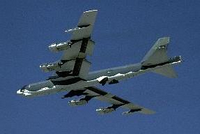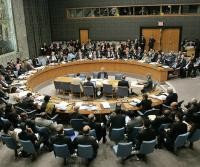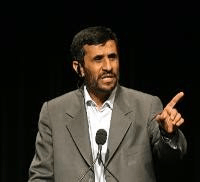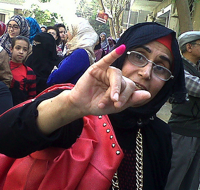Côte d’Ivoire recently announced that it would not be able to make payments on its external debt in 2011, prolonging a default that originated in the crisis following the country’s disputed 2010 presidential elections. In an email interview, Yvan Guichaoua, a lecturer in politics and international development at the University of East Anglia, discussed Côte d’Ivoire’s economy and finances. WPR: What are Côte d’Ivoire’s main agricultural and industrial sectors, as well as its principal export and trade relationships? Yvan Guichaoua: Côte d’Ivoire is the world’s largest producer of cocoa. This cash crop represents 70 percent of the country’s export earnings […]
Africa Archive
Free Newsletter

As the Libya operation enters what appears to be its final phase, the debate is only beginning as to what it portends for the future of U.S. policy and the international system as a whole. The course of events in Libya over the past months validates what I have termed the “just enough” doctrine. The Obama administration successfully resisted pressure — from Libyan rebels, European allies and domestic critics alike — to increase the U.S. role in order to achieve a faster outcome in Libya. If that doctrine takes on greater coherence, it could strengthen the arguments for limited, targeted […]

The future of Libya was never terribly important to the U.S. That has now changed. Under the rule of the flamboyant Col. Moammar Gadhafi, Tripoli managed to garner a lot of attention, but, in fact, the country had only marginal strategic importance to the West. Then-Secretary of Defense Robert Gates admitted as much soon after the U.S. agreed to join a NATO effort on the side of the rebels seeking to topple the regime. Once NATO launched its operation in Libya, however, the stakes for Washington suddenly grew. And now more than ever, with Gadhafi out of power, Libya has […]

With the breaking of Libya’s many-month stalemate, the end of a 42-year reign of megalomaniacal tyranny has arrived. As the rebels attempt to consolidate power in Tripoli, however, what lies ahead for Libya as a nation and for the foreign powers that paved the way for Moammar Gadhafi’s ouster remains far from certain. Key to the future of a viable Libya will be law, stabilization and reconstruction so that civil society can be re-established swiftly. After four decades of inequity, revenge will be hard to avoid. Nonetheless, Libya’s National Transitional Council (NTC) has emphasized to rebel fighters that retribution against […]

Over the past few days, Libyan rebels supported by NATO airstrikes have seized most of Tripoli. The rebels’ apparent military success has quieted, at least for the moment, many critics of NATO’s military strategy in Libya. While a full account of the lessons learned from the conflict must await the writing of a full history — not to mention the end of the actual war — the events of the past few days demand a degree of re-evaluation of how the campaign was conducted. Indeed, this column has offered several critiques of NATO’s performance, including commentary on the dubious legality […]
Iran announced last month that it would send aid to Malawi, shortly following cuts in aid to the Southeast African country by the U.S. and the U.K. In an email interview, Scott Lucas, an expert on Iran at the University of Birmingham, discussed Iran-Africa relations. WPR: What is the current state of Iran’s development aid and investment in Africa? Scott Lucas: Iran has continued, despite — and arguably because of — international sanctions, to make a significant effort to further its diplomatic and economic ties with African countries. High-ranking Iranian officials, including the foreign minister, have toured the continent, and, […]
Nigeria and Cameroon recently negotiated a draft border agreement that would, among other things, allow hydrocarbon exploration along the countries’ shared border. In an email interview, John Campbell, the Ralph Bunche senior fellow for Africa policy studies at the Council on Foreign Relations and a former U.S. ambassador to Nigeria, discussed Nigeria-Cameroon relations. WPR: What is the current state of diplomatic relations between Nigeria and Cameroon? John Campbell: Diplomatic relations between Abuja and Yaoundé appear to be excellent, certainly at the presidential level. There is ongoing dialogue about regional issues, especially those involving the Gulf of Guinea. Former Nigerian President […]

Despite the jubilation that followed South Sudan’s largely peaceful vote for independence in January, relations with northern Sudan have since deteriorated. In May, just weeks ahead of South Sudan’s July 9 independence day, the Sudanese army occupied the contested Abyei border region. In response, the United Nations Security Council authorized a peacekeeping mission, UNIFSA, to monitor the border and protect civilians there. On Aug. 4, four Ethiopian peacekeepers deployed with UNIFSA were killed after their vehicle struck a landmine in Abyei. Three of the soldiers reportedly died from their injuries after a United Nations medical evacuation helicopter was delayed three […]

As massive protests shook Iran in June 2009 following President Mahmoud Ahmadinejad’s widely contested re-election, Arab leaders around the region watched the unfolding events with a mix of wariness and satisfaction. Unnerved by the Obama administration’s overtures of rapprochement with the Islamic Republic, many had a keen sense that Iran would emerge from the crisis weakened and more isolated internationally. They were largely correct. Some two years later, it is the Iranians who are closely following the slew of uprisings — and violent crackdowns — that have rocked the Arab world. While initially reticent to weigh in, Tehran could not […]

The Western news media has made much over the recent decision by Egypt’s transitional government to ban foreign election monitors from the country’s upcoming parliamentary polls. The more important story, however, has been buried: The transitional regime, which includes no women, has scrapped quotas for women in the national legislature, while retaining them for farmers and workers. In the previous legislature, Egypt’s mandatory quota system allowed women to hold approximately 13 percent of the seats — 64 out of 445. Now, the only protection for women will apply to the half of the new parliament’s seats that will be elected […]
